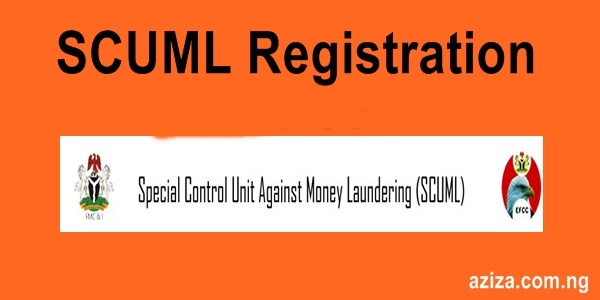As a business owner who want to register and obtain SCUML certificate, what and what do you need to complete your SCUML registration?
SCUML registration can be done on their various offices in Nigeria or can carried out through the SCUML online registration platform. DNFIs are advised to visit SCUML website for guidance.
SCUML Registration Requirements are as follows:
Certificate of Incorporation/Registration
Form CAC1.1 (Form Co2& CO7 for old registration)
Memorandum and Article of Association
Tax certificate or TIN print out
Company profile
Incorporation of Trustees
Constitution as regards NPOs
Professional Certificate ( for Professionals)
Click FOR BUSINESSES THAT REGISTERS WITH SCUML.
As at the time of this post, SCUML offices are located as below?
ABUJA HQ:
No.1 Obosi Crescent, Off Ogidi Street off Ladoke Akintola Boulevard Garki 2, Abuja.
Benin City:
No.1, Court Road, GRA, Benin City, Edo State
ENUGU:
Plot 106 FGC Road, Independence Layout, Enugu
GOMBE:
NO.4 EFCC Street, New GRA, Gombe.
IBADAN:
No.16,Rev’d Oyebode Crescent Iyaganku GRA, Ibadan
KADUNA:
No. 4 Wurno Road off Rabah Road, Kaduna
KANO:
GP 360 Bida Road Civic Centre
LAGOS:
15, Awolowo Road, Ikoy, Lagosi
MAIDUGURI:
Plot 80 Baba Shehu Lamin opp El Kanemi College Tudun Wada Layout, Maiduguri
Port Harcourt:
No. 8 Bank Road, Off Moscow Road, Port Harcourt, Rivers State,
Uyo:
No 3 Akparawa Crescent Off Edet Akpan Avenue ,Ewet Housing Estate, Uyo, Akwa Ibom State.
SCUML’s MANDATE:
SCUML has the mandate to Monitor, Supervise and Regulate the activities of Designated Non Financial Institutions (DNFIs) in consonance with Nigeria’s Anti-Money Laundering and Combating the Financing of Terrorism
(AML/CFT) regime. All DNFIs are obligated to register with SCUML and ensure compliance with the relevant
sections of the ML (P) Act 2011, (as amended) in order to avoid sanctions for noncompliance.
Note
SCUML collaborates with the Economic and Financial Crimes Commission (EFCC) for the enforcement of the provisions of the Act through enforcement actions including prosecution of non-compliant DNFIs. HIGHLIGHTS OF RELEVANT SECTIONS OF THE MONEY LAUNDERING (PROHIBITION) ACT, 2011(AS AMENDED) AS IT RELATES TO DNFI’s
Section 1:
Limitation to Make and Accept Cash
Section 2:
Duty to Report International transfer of Funds & Securities
Section 3:
Identification of customers
(Part III of SCUML Regulations Emphasizes on the Need To Know Your Customer).
Section 4:
Duties Incumbent upon Casinos
Section 5:
Registration with SCUML
Rendition of Occasional Cash Based Transactions( CBTRS)
Section 6
Suspicious Transaction Reporting (Part IV of the SCUML regulations)
Section 7
Preservation of Records
Section 8
Mandatory Disclosure by DNFI
SECTION 9
Arouse Awareness Among Employees.
Section 10
Mandatory Disclosure by DNFI
Penalty /Fine
Section 15 & 16
Money Laundering Offences
Other offences

